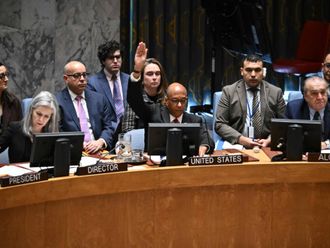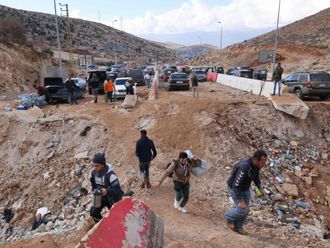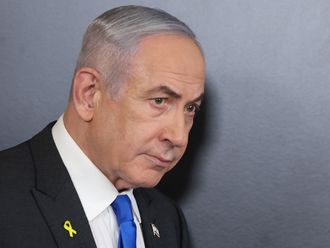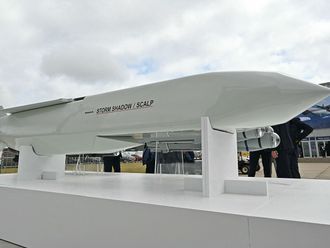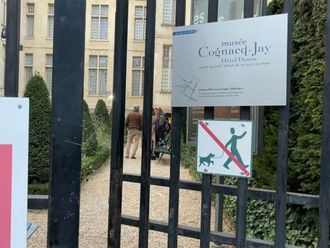Abu Dhabi: The level of trust between the six-member Gulf Cooperation Council and America in the political arena is at an all time low thereby affecting security partnerships, leading political analysts say at a time of strained rapport between Washington and the GCC states over differences on shifting relations with Iran, and involvement in Syria’s civil war.
Thus the GCC states need to push hard for their voices to be heard while their fates and peoples are negotiated away by outside powers, analysts argue as US Secretary of State John Kerry visited the UAE and stressed his country’s commitment to defend its allies in the Gulf region against any threat.
Dr Abdul Khaleq Abdullah, professor of political science at the UAE University, said (US President Barack) Obama’s failure to deliver on enforcing the red lines on Syria has dealt a massive blow to the GCC countries’ confidence in the American administration.
“The UAE should use its political leverage as it represents the Arab and Gulf conscience to get a clear message across to the American top diplomat – the US has failed and is failing its important allies when most needed,” Dr Abdullah said.
Dr Abdullah said America has also acted with great haste, rushing towards Iran to strike a deal on its controversial nuclear programme at all cost.
“The GCC countries have deep and legitimate concerns that any deal which leaves Iran with the option of resuming uranium enrichment to the level needed for nuclear bombs in future undermines interests of the countries in the Gulf region,” Dr Abdullah said.
Dr Abdullah said Iran has to give strong assurances that it will never develop atomic bombs and commits itself to IAEA’s safety standards for protecting the environment and humans.
The Islamic Rebuplic has also to sign additional protocols which allows unannounced inspections outside of declared nuclear sites and it is seen as a vital tool at the IAEA’s disposal to make sure that a country does not have any hidden nuclear work.
The nuclear power plant near earthquake-prone coastal area of Bushehr, facing its Arabian Gulf neighbours, which Iran insists is quake-proof, is closer to Abu Dhabi, Doha, Kuwait City and Manama than it is to the Iranian capital Tehran.
Dr Ebtisam Al Katbi, Chairperson of the Emirates Policy Centre, said GCC countries have several rreasons to object to this understanding:
First, the Iranian regime does not recognise the existing world order, but it uses its institutions to serve Tehran’s objectives, which does not abide by the rules of this order.
Second, Iran has built the important elements of its nuclear programme behind the back of the International Atomic Energy Agency (IAEA).
And despite its pursuit of the nuclear program, the tight sanctions were late and only imposed when Iran was close to the “nuclear threshold”, which makes negotiations with Tehran on this programme a mere process that leads to the suspension of Iran’s nuclear ambitions at best, but not to put these ambitions within the framework of the IAEA rules once and for all.
Third, Iran is trying to impose itself as a regional power as part of a sectarian–nationalist geopolitical project that seeks to reshape, fragment and change the face of the region. But this is done by exploiting the prevailing international atmosphere of fighting terrorism in which Iran is contributing to consolidating allegations of attributing terrorism to countries of the region.
Fourth, GCC states are not represented in the 5+1 talks, although the Iranian nuclear programme poses a serious and equal threat to all GCC member countries more than other countries.
The confiscation of these countries’ right to attend these meetings by the American partner on the pretext that Washington will convey these countries’ concerns in any arrangements shows disrespect for these countries. Furthermore, Iran is not keen to send any genuine signal to reassure these countries.
In other words, both Washington and Tehran want to reach an understanding about the nuclear programme and its geopolitical consequences on the region with a complete disregard of GCC countries and its concerns.
Dr Theodore Karasik, Director of Research and Consultancy at the Dubai-based Institute for Near East and Gulf Military Analysis
At this time no deal appears to be acceptable to the GCC because the member states are not part of the P5+1 talks. The US Secretary of State is acting as a messenger of any results from the last few days of talks. This type of delivery of information makes diplomatic relations terse and one-sided.
In other words, America’ ability to provide a useful and meaningful strategic information campaign is lacking especially in the wake of Iraq, Syria, and Egypt. Moreover, the Gulf states are very concerned by Iran’s nuclear program whether for power generation or weapons capability.
The GCC states are troubled by the reliability of Tehran’s intent including the safety and security of the Islamic Republic’s programmes. These GCC views are likely not fully represented in the ongoing talks. Overall, the level of trust between the GCC and America in the political arena is at an all time low thereby affecting security partnerships. Thus the GCC states need to push hard for their voices to be heard while their fates and peoples are negotiated away by outside powers.
Given the perception in the region that America is playing catch up from behind as opposed to forward thinking about the post modern Middle East system, local reactions are sharpening against the US.
America seems to lack overall strategic vision and appears to be only see one issue at a time. This fact maybe caused by President Obama’s leadership style. But the ramifications are serious: Arab states and organisations are searching for American leadership
but are not seeing any concrete results.
Thus, disappointment is rising including the possibility of a third intifada. It is high time for the GCC states to take a larger role in determining the future of the region.


